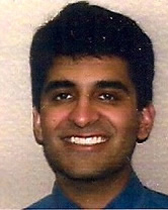Raman Khanna, MD '02

I came to religious studies the way many come to religion itself: serendipitously. In the days before electronic registration, we lined up in Blomquist auditorium and waited in lines labeled "History", "Physics", etc. to sign up for our required courses. As I was halfway into the Political Science line, "Introduction to International Relations" was announced as closed. I meandered to the front and as I did, the woman at the adjacent Religion desk called out--"why not take New Testament Origins, it's at the same time as IIR." I thought, why not? The rest was history.
I proceeded to take classes in Christian Martyrs, Islam in America, Native American traditions, Zen Buddhism, Confucianism/Daoism/Chinese thought. Comparative religious studies was a window into the most important questions humankind has ever posed--why are we here, how do we make sense of and transcend suffering--and how various individuals had sought to answer these questions through experience and revelation, and situate those answers in the context of both theory and practice.
Though my trade is now medicine, I continue to wrestle with these questions, both at work and outside of it. Most especially my work with the Hindu American Foundation, an organization dedicated to fostering a pluralistic public space that does not ignore the non-Abrahamic traditions, calls out the religion major in me, again and again. The analytical techniques and breadth of knowledge I learned from Drs. Taylor, Ziporyn, and Kinnard have helped me enormously in both interfaith understanding and in looking into my own Hindu beliefs and practices and articulating them more effectively. For these skills and for this knowledge, I will always be grateful to these faculty, and to the department as a whole.
I proceeded to take classes in Christian Martyrs, Islam in America, Native American traditions, Zen Buddhism, Confucianism/Daoism/Chinese thought. Comparative religious studies was a window into the most important questions humankind has ever posed--why are we here, how do we make sense of and transcend suffering--and how various individuals had sought to answer these questions through experience and revelation, and situate those answers in the context of both theory and practice.
Though my trade is now medicine, I continue to wrestle with these questions, both at work and outside of it. Most especially my work with the Hindu American Foundation, an organization dedicated to fostering a pluralistic public space that does not ignore the non-Abrahamic traditions, calls out the religion major in me, again and again. The analytical techniques and breadth of knowledge I learned from Drs. Taylor, Ziporyn, and Kinnard have helped me enormously in both interfaith understanding and in looking into my own Hindu beliefs and practices and articulating them more effectively. For these skills and for this knowledge, I will always be grateful to these faculty, and to the department as a whole.
